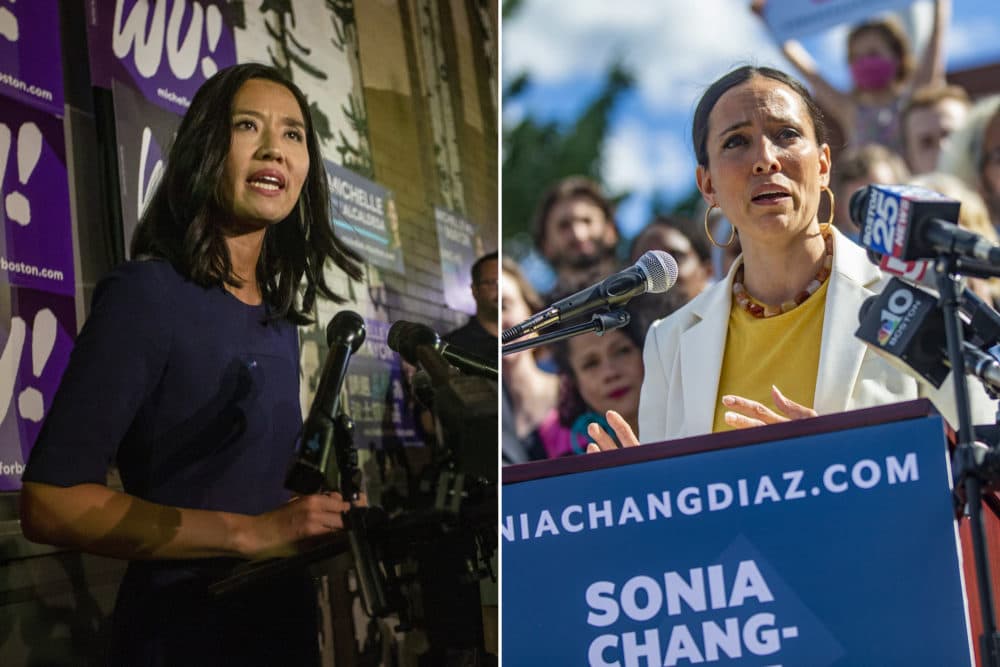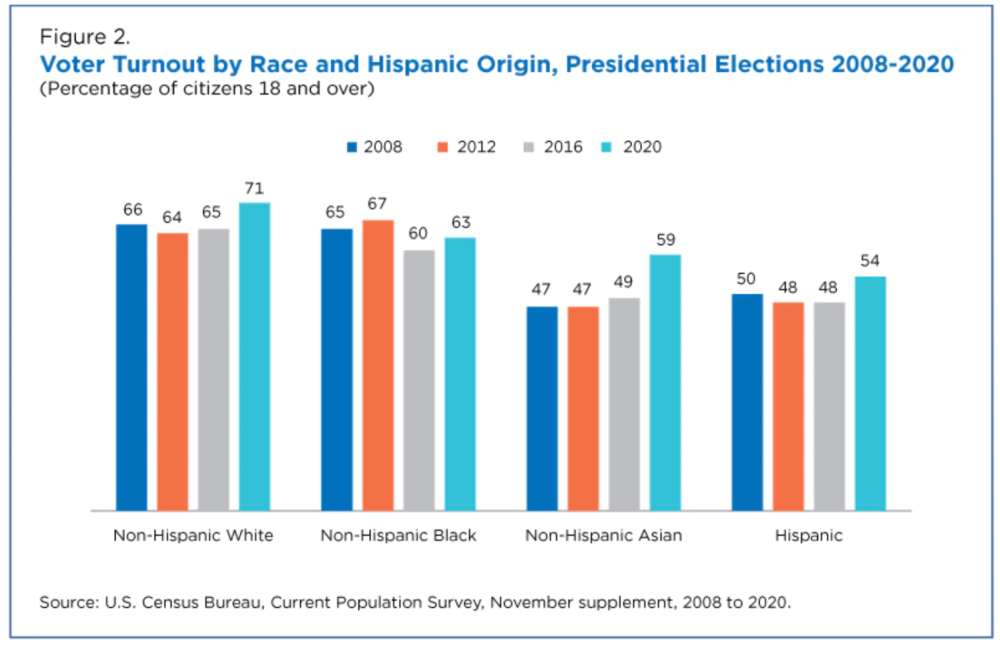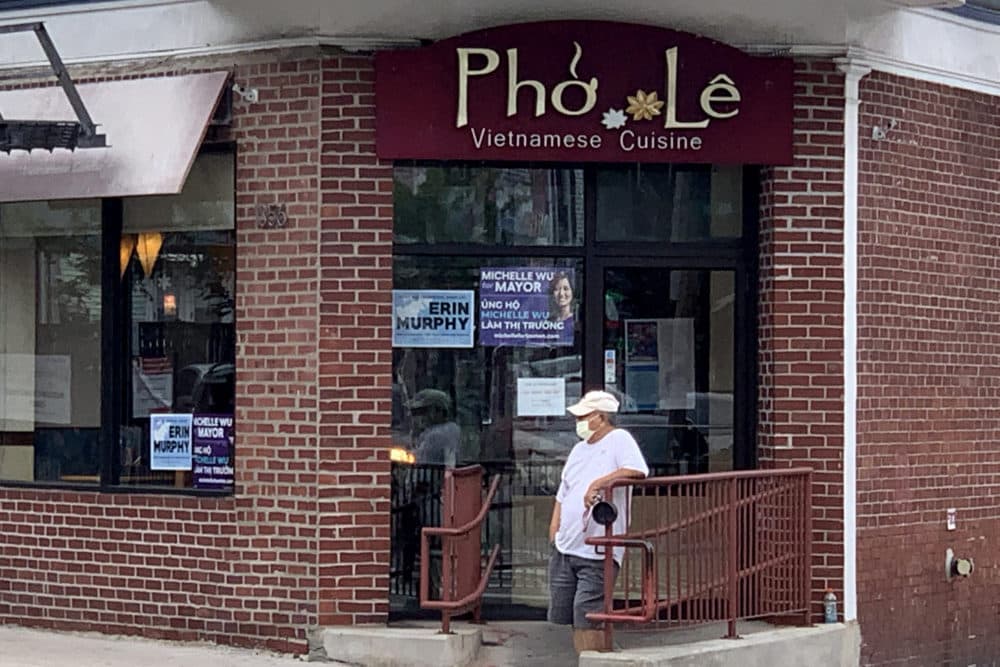Advertisement
Asians Are Underrepresented In Mass. Politics, But Wu And Chang-Diaz Are Trying To Change That

It's a weekday afternoon in Chinatown and signs for Michelle Wu are in restaurants, bakeries and gift shops.
Councilor Wu is a regular presence here. So community activist Dick Wong is hoping she becomes Boston’s next mayor.
"She always comes over here, talks to our people," Wong says, standing in the David Wong Reading Room on Beach Street, surrounded by Chinese newspapers and literature. "We told her what we really need, so she keep in mind and try to help us."
Asian Americans have long been underrepresented in politics — in Massachusetts and across the country. Now that could be starting to change, with Asian Americans seeking some of the most prominent positions in the state: Wu for mayor and state Sen. Sonia Chang-Diaz for governor.
Wu and Chang-Diaz are are among a small but growing list of Asian politicians in Massachusetts. The State Library notes that Chang-Diaz was both the first person of Asian descent in the state Legislature and the first Latina elected to the state Senate. Nine out of 200 state lawmakers now identify as Asian American, tracing their ancestries back to China, Vietnam, Korea, Japan and Cambodia.
And more Asian Americans are running for local office — from school committee to mayor — says Paul Watanabe, of the Institute for Asian-American Studies at UMass Boston.
"They reflect much of the diversity that exists among the Asian-American electorate," he says, "in ways somewhat unprecedented around the country.”
Asians represent the fastest growing ethnic group in the United States. Here in Massachusetts, the Asian population grew by more than 40% over the last decade. And they are becoming more politically active. Nationally, U.S. Census Bureau data shows Asians had the biggest increase in voter turnout in 2020.

Having an Asian candidate on the ballot means representation for some folks. But Lydia Lowe of the group Chinese Progressive Political Action says Asians won't vote for candidates just based on their ethnicity.
Her advocacy group endorsed a Black candidate — acting Mayor Kim Janey — in the Boston mayoral race earlier this year.
"We felt it was important for the progressive Chinese community to stand with other communities of color," Lowe says. After Janey was eliminated in the preliminary election, Janey, in turn, endorsed Wu.
Most Asian voters support Democrats, but their politics can vary widely depending on factors like which country their families are from, and how they came to the United States. It’s similar among Latinx voters; Cuban Americans often vote Republican, while people of Mexican descent are more likely to back Democrats.
Not A Monolith
"Asian Americans in Boston are certainly not just a monolith," says Ling-Mei Wong, a journalist who previously edited the bilingual Chinese newspaper Sampan.
Wong added that Michelle Wu — who was born in Chicago and whose parents immigrated from Taiwan — can’t necessarily count on the entire Asian vote, which is mostly Chinese, but includes thousands of Vietnamese as well.
Wu was the top vote-getter in the preliminary election and just picked up an endorsement from Janey last week. That could give her an edge against Councilor Annissa Essaibi George in the general election in November.
Still, the AAPI Action Group, which consists of prominent Asian Americans in the area, decided to back Essaibi George. One of the group's leaders, Betty Lim King, says she would love to see an Asian mayor, but thinks Wu is the wrong choice.
"She’s not from Boston, and Annissa is. Annissa is mature, she has 14 years [as a] Boston public school teacher. And she's more grounded — not pie in the sky, if you know what I mean," King says.
Advertisement
King says she expects to start seeing Essaibi George signs in Chinatown shop windows soon.
Both mayoral candidates are hunting for votes in the neighborhood, which Wu won handily, as well as Fields Corner in Dorchester, home to a large Vietnamese community around an area dubbed "Little Saigon."

At Kimmy Pharmacy in Little Saigon, owner Tuan Tran says he likes both candidates. But he’s leaning toward Wu because he thinks she's best prepared for the job.
As an "Asian person, I'm proud to know Michelle Wu is qualified," he says. But he says Wu's Asian heritage is not the only factor.
Asians represent less than 10% of Boston’s population, but could prove crucial in a tight local race. And with a growing population across the state, the Asian vote could become increasingly important in Massachusetts politics in years to come.
Correction: An earlier version of this story misspelled Beach Street. The post has been updated. We regret the error.
This segment aired on September 29, 2021.
